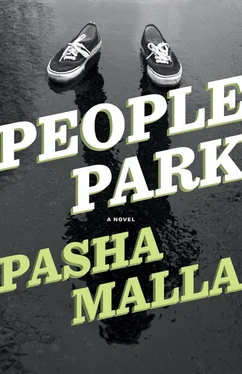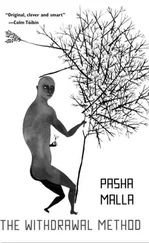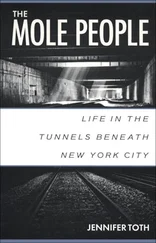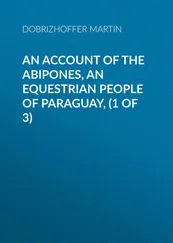Diamond-Wood tapped the Mayor’s shoulder. How are you?
Fine, fine, she said, absently stroking her sash. Just watching everything go under.
It might be time to get out of there, said Griggs.
Yeah, said Diamond-Wood. What about you?
I’m the Head Scientist! I can’t leave. . Griggs sighed. Besides, where would I go?
Diamond-Wood waited.
You’re young, Recruit. Save yourself.
And the Mayor?
Does she want to be saved?
Diamond-Wood looked at the Mayor, the sagging shape of her silhouetted in the light of the viewing deck, the sash an empty bandolier, the sunset streaming through her midsection as a bulb through a lampshade. Maybe not, he said.
I can understand that, said Griggs.
Want me to ask her?
No. No, that’s okay. And D-W? Tell her one thing, will you? Tell her we’re sorry.

AS THE SUN SET the air cooled, Olpert was glad for his jacket, though his bare legs were goosefleshed. He and Gip followed Pop Street out the gates of the Necropolis and down into the boggy dump. The smell here was sour and yellow, the water oily, silky mats of gas floated atop its surface. Gulls watched and squawked mockingly as the threesome waded down a channel between mounds of trash.
Pop shrieked, Lark! and gestured grandly before him: his houseboat was lodged between the rusted-out shell of an old Municipal Works snowplow and the dump’s back fence. Thar she goes, he declared, wading toward it. My home!
Overhead a helicopter peeled off toward People Park, where Olpert watched it join dozens of choppers tracing interweaving loops in the dusky sky.
Hey, mister, said Gip, it’s okay, that chopper’s not Raven’s.
Raven?
The illustrationist! He’s gone, I think.
Oh.
I thought maybe? Since I was the chosen one? I could do something? But —
Hurry! Pop called, heaving himself up the ladder. Restribution awaits!
Gip was pulled aboard and ushered inside the cabin. Olpert went to follow him — but Pop stepped to the gunwales with an oar and blocked his way.
Not you, evil one, he said. You’re one of them. An esquivalient.
What?
Not with us, said Pop. Not here. Not this time.
Olpert stared.
Ah, and now at last he sips the cruel cider of justification! Pop seemed to address an imaginary audience that might not have included Olpert. No, we shan’t save those whom propetuate the substantiation of a people’s past. You don’t care about history? Well now, Pop snarled, you’re the one whom is history.
He beat the water with his oar. For a moment, delight twinkled in his eyes, then a stony facade slid overtop. Expunge yourself, he growled.
Please, said Olpert, come on, I’m not the enemy here, I’m not with those people —
Expunge!
But I helped you. I helped the boy, and I freed you. I’m not one of them.
Pop raised the oar above his head, menacing a deathblow. Bygone, be bygone!
Olpert sank back into the water. The highest dry land was a mountain of junked appliances — rust-scabbed fridges and stoves and washer-dryers missing doors and dials. He climbed atop a dishwasher, his own wake slurped at the pile, and sat there, quietly.
A fine place for you, evil one, said Pop, amid the city’s refutations. Then he joined Gip inside the cabin, slamming the door behind him.
Olpert’s heart skipped beats. Though, wait — something actually twitched and jumped around inside his jacket. Jessica! But in the pocket was not a mole, but a bird. He set it down, it toggled from one foot to the other, shuddered with a sort of mute sneeze, and took to the air: an m-shaped silhouette, then a speck, then vanished. Another newscopter passed above, from it a spotlight searched for — what? Bodies, survivors, stories.
Pop came out of the cabin, went to push off, and discovered that, despite the rising water, the houseboat was stuck fast on a reef of trash. He dug his oar into a pile of softened cardboard, tried to dislodge the boat. Grunts, groans, splashing. . failure. He knelt, catching his breath. Olpert watched. And Pop met his eyes. Help me, he gasped.
Olpert didn’t move.
Evil one! I am immobilized without another helmsman, it seems. Hence you may come onboard, yet don’t envisage yourself anything but enemary. For you are only such.
Sure, said Olpert.
As Olpert climbed the ladder Gip’s face appeared in the cabin’s porthole: he observed the action on deck with the aloof interest of a gossipy neighbour.
All right, evil one, said Pop, handing him an oar. If you’re with us be at least aidful.
From either side of the houseboat they heaved at the sludge, the boat creaked in protest, or encouragement. At last with a scraping sound they dislodged, coasted out into the floodwaters, and Pop swung them round toward Topside Drive.
Where to? said Olpert. Should we try to find the boy’s parents first or —
Neigh! Initially — Pop adopted a preacher’s cadence — one last trip home. For though the day enduskens, still the blazing sun of restribution beckons beaconlike my soul.

THE WATER POOLING in the Museum of Prosperity lent it the look of a marble-pillared bathhouse. Debbie sloshed through the rotunda, climbed the stairs out of the water to the second floor. Footsteps echoing with the promise of a secret knock, she passed through Loopy’s retrospective — busts of the island’s rich and famous, dozens of self-portraits, the Faces of Us: had been transplanted here too — to the room that housed the IAD’s modest collection of Mr. Ademus’s work: four rusty sculptures on plinths.
And here she discovered the island’s artist laureate, slumped against a wall. Debbie stopped. Loopy regarded her idly, beret twisted in her hands.
Hi, said Debbie.
No, said Loopy, low. I’m feeling very low.
Oh yeah?
All my work, said Loopy, with a sweeping gesture toward the adjoining galleries, is going to be destroyed. And then what will I have? What’s an artist robbed of her work?
I’m actually looking for someone, said Debbie, inching past.
Wait.
Debbie froze.
Listen to me, said Loopy. All of you, you thought I was serious. The whole time, you never knew. This, all of this — none of you ever saw what it was.
What was that? said Debbie.
You think I didn’t know how absurd I seemed? I mean, Loopy ? This ridiculous outfit? Paintings of people on TV? Not that it matters now. It’s all amounted to nothing, anyway.
Yeah, said Debbie, edging up the spiral staircase, that sucks, good luck.
Nothing. Nothing! NO-THING . .
Debbie climbed, Loopy’s squawking faded as she curled up and up, the tap of her sneakers, the swish of the banister under her hand, spiralling all the way to the towertop gallery. She tried the handle: locked. Her legs weakened, her spirits felt punctured —
A voice called, Who is it?
And Debbie said, It’s me.
Silence. A whispering of feet. A pause.
The catch clattered, the door opened, and standing there was Adine.
It’s you, she said.
Hi, said Debbie.
They stared at each other for a moment.
You’re not wearing the goggles, said Debbie.
No, said Adine. I took them off.
From somewhere in the Museum came a feeble, plaintive keening.
I guess you saw Loopy? said Adine.
Debbie grinned. Nothing, nothing.
No-thing ! laughed Adine. And they kissed.
You found me, Adine said, pulling away. You came.
Of course, said Debbie. Of course I did. I’m sorry.
It’s good to see you, Deb.
Читать дальше













